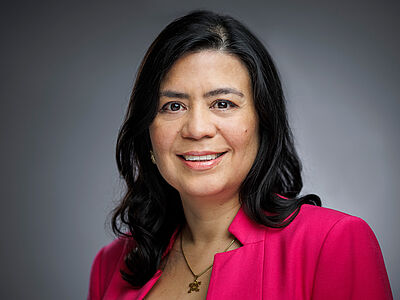Women Going Digital. Supporting women towards the digital future

The digital transformation is changing industries worldwide – and opening up new opportunities for employees. And yet women are much less likely to benefit from this trend, as they are often underrepresented in the digital economy and therefore lacking in essential skills. This is where the learning programme Women Going Digital comes in. The programme is aimed at women seeking to enhance their digital literacy and offers companies the opportunity to strengthen staff skills ahead of the digital transformation. Best of all, the online course can be flexibly integrated into day-to-day work.
Launched in 2020, Women Going Digital is an online programme developed by the Agency for Business and Economic Development (AWE) in collaboration with Business Scouts for Development and the German Chambers of Commerce Abroad (AHKs). Its aim is to narrow the gap between men and women in the digital economy. Initiated by the Deutsche Gesellschaft für Internationale Zusammenarbeit (GIZ) GmbH and supported by the Federal Ministry for Economic Cooperation and Development (BMZ), the programme is implemented by AWE together with partners from the private sector and foreign trade promotion. It provides an interactive digital learning environment in which women, multipliers and representatives of civil society organisations acquire valuable knowledge on topics related to digitalisation. Following a successful pilot phase in Brazil and Mozambique, the course has now been rolled out in Argentina and Peru (Portuguese and Spanish) and in Namibia, Cameroon and Ghana (English and French).
Course and learning content
The online course comprises 16 modules, in which participants develop their knowledge of various aspects of the digital transformation, including agile methods, blockchain, 3D printing, cloud computing, data protection and data security, e-commerce and artificial intelligence. Each topic consists of learning formats designed to engage participants with teaser videos, online training, podcasts, quizzes and additional resources. Audio transcripts of videos and podcasts ensure the course remains accessible for all.
Content is tailored to the needs and requirements of women employees in the respective countries and is available in several languages. Participants can be flexible and learn at their own pace, and course materials can be accessed on multiple devices. The programme also includes practical seminars, workshops and networking opportunities with industry experts. After successfully completing the course, participants receive a certificate in digital skills.
Benefits for companies
The learning programme directly benefits companies conducting business in developing countries and emerging economies. In fact, participation by company employees may bring a whole raft of benefits:
- Increased productivity: digitally literate staff are more competent in their use of digital tools and platforms.
- Competitive advantage: companies with trained staff are better prepared for the digital transformation.
- Stronger employer brand: companies that invest in training for their staff are seen as attractive employers.
Promoting digital skills among women is also relevant from a development policy perspective:
- Narrowing the gender divide: women are underrepresented in the IT sector, particularly in the Global South. Here, training promotes equal opportunities.
- Economic growth: investment in training for women contributes to economic development.
- Social justice: digital training promotes gender equality in the world of work.
Around 800 women have taken advantage of the training programme since the project began. In Brazil alone, over 300 women have successfully completed the course; in Namibia, around 100 women have completed the programme (as of November 2024). Many of them have spoken of improved career prospects. Local companies also report that graduates are better able to use digital tools and work more productively.
For further information, we offer you a fact sheet.
Download Fact Sheet
Information about Women Going Digital on websites
Cooperation arrangements and future objectives
AWE works with many different partners – in addition to the German Chambers of Commerce Abroad – to implement Women Going Digital. In Brazil, for example, the programme was implemented together with SAP, Siemens and GFT. In Mozambique, support is provided by the Centro Cultural Moçambicano-Alemão, a Goethe-Institut partner. The AHKs usually arrange contacts with the companies and are therefore key partners for knowledge transfer and job placement. A range of companies, institutions and non-governmental organisations also participate in selected webinars.
The plan going forward is for Women Going Digital to work even more closely with companies, so as to further increase employment opportunities for women graduates. The project therefore makes an important contribution to gender equality in the digital economy. In Africa, in particular, the aim is to take the project further. However, the model also has the potential to be rolled out globally, since many companies are desperately looking for women staff with skills in the IT sector.
Published on

